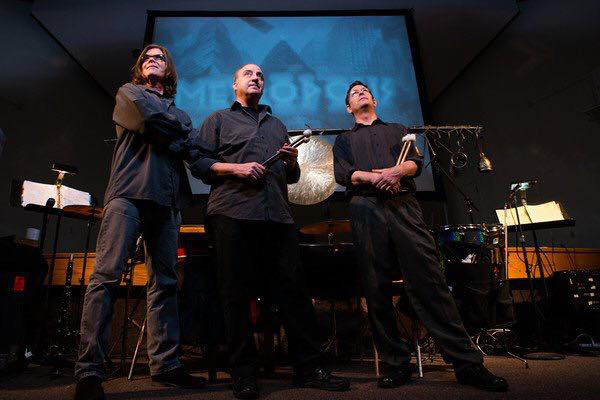Alloy Orchestra plays Nov. 3-5 with scores for four silent classics
By Daniel Aloi

Ivan Singer Photography/Alloy Orchestra
The Alloy Orchestra returns to Cornell Cinema Nov. 3-5 to perform original scores for four classic European silent films in Willard Straight Theatre.
The three-day engagement on their 25th anniversary tour will feature the ensemble reprising two of their best-known scores – for Russian director Dziga Vertov’s 1929 documentary “Man With a Movie Camera,” Nov. 4 at 9:15 p.m., and Fritz Lang’s 1927 science-fiction masterwork “Metropolis,” Nov. 5 at 7:15 p.m.
The orchestra also performs two new scores, for Marcel L’Herbier’s groundbreaking 1924 sci-fi drama “L’Inhumaine (The Inhuman Woman),” Nov. 3 at 7 p.m., and E.A. Dupont’s “Varieté,” a drama set at a seedy Berlin carnival, Nov. 4 at 7 p.m.
Tickets are on sale at cornellcinematickets.com. “Metropolis” tickets are $14, $12 for students and senior citizens; tickets for the other screenings are priced at $12 and $10. An “Alloy x 3 Pass” (available online or at either of the first two shows) is good for any three of the four programs, at a discounted price of $32, $25 for students and seniors.
With its quirky, percussive scores, the Alloy Orchestra trio often sounds like a 12-piece orchestra, and has inspired other musicians to compose for silent films, which have enjoyed a resurgence of interest and popularity in no small part due to their work. Based in Cambridge, Massachusetts, the trio’s members are Roger C. Miller on synthesizer; Terry Donahue on junk percussion, accordion, saw and banjo; and Ken Winokur on junk percussion and clarinet.
“Man With a Movie Camera,” with an original score derived from Vertov’s notes to his composer, is being shown in a new digital restoration taken from the director’s personal print, left in Amsterdam after the film was banned in the USSR.
“This restoration is so much better than previous versions that it’s like watching the film for the first time,” said Winokur, who describes it as “an exquisite, full-frame, nearly scratchless, gorgeous contrast restoration that blows away the regular 35mm film print or its DVD restorations that we’ve used in the past.”
Two other films also are newly restored. “L’Inhumaine” is an innovative feast of experimental technique and artistic collaboration, filmed three years before “Metropolis.” Alloy’s press materials say their score “is one of our most audacious, and perfectly matches the tone and atmosphere of this strange film.” The avant-garde sets were created by painter Fernand Léger, architect Robert Mallet-Stevens and designers (later directors) Alberto Cavalcanti and Claude Autant-Lara.
“Varieté,” from 1925, is a tense story of jealousy and betrayal, starring German screen legend Emil Jannings (also popular in Hollywood in the 1920s, he was the first actor to win an Oscar) and Hungarian-born femme fatale Lya de Putti, with trapeze scenes filmed in the original Berlin Wintergarten theater. Cinematographer Karl W. Freund also shot “Metropolis.”
The version of “Metropolis” being shown is the definitive restoration, completed after 25 minutes of lost footage was discovered in Argentina. It premiered here in 2010, with the Alloy Orchestra accompanying; to date they have scored four different versions of the film.
“Cornell Cinema began hosting the Alloy in the fall of 1999 when they performed with Eisenstein's ‘Strike,’ the truncated version of ‘Metropolis,’ and a shorts program for kids entitled ‘Masters of Slapstick,’ and we've been bringing them back on a near-annual basis ever since,” Cornell Cinema Director Mary Fessenden said.
“Over the years, I’ve thoroughly enjoyed the silent classics they’ve performed with, films like Hitchcock’s ‘Blackmail,’ Buster Keaton’s ‘The General,’ Vertov's ‘Man With a Movie Camera,’” she said. “But I’ve been particularly delighted with the ‘new’ silent films they’ve introduced me to, like the German Expressionist film ‘From Morning to Midnight,’ the French melodrama ‘Dans La Nuit’ and Josef von Sternberg’s gangster film ‘Underworld,’ films I never would have seen otherwise.”
During this engagement, Fessenden is looking forward to the screening of “Varieté” – “the new film in the bunch for me,” she said.
“A wonderful benefit of having such a long-standing relationship with the ensemble is that they were happy to visit on a complimentary basis in 2010 to help Cornell Cinema celebrate its 40th anniversary.”
The Alloy Orchestra’s visit is cosponsored with Cornell Council for the Arts; the College of Architecture, Art and Planning; the Departments of Music, Performing and Media Arts, and German Studies; the Institute for German Cultural Studies; and the Wharton Studio Museum.
Media Contact
Get Cornell news delivered right to your inbox.
Subscribe